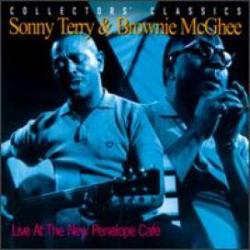Sonny Terry & Brownie McGhee – Live At The New Penelope Cafe (1967)
Sonny Terry & Brownie McGhee – Live At The New Penelope Cafe (1967)

1 Hooray Hooray (These Women Is Killing Me) Kirkland, Terry 4:41 2 Cornbread, Peas and Black Molasses McGhee, Terry 4:58 3 Sportin' Life Terry 4:49 4 Come on, If You're Coming McGhee, Terry 5:33 5 Blues Medley: Next Time You See Me/In the Evening/Key to the Highway Forest , Harvey 9:53 6 Easy Rider McGhee, Terry 3:15 play 7 Pack It Up and Go McGhee 2:57 8 Hootin' the Blues Terry 5:47 play 9 Under Your Hood Dupree 4:30 10 Walkin' My Blues Away McGhee, Terry 6:53 Brownie McGhee Guitar (Acoustic), Vocals Sonny Terry Harmonica, Vocals Recorded In Montreal, Canada, on February 7, 1967
It sometimes seems like there are about 90 live albums by Sonny Terry and Brownie McGhee, all from the 1960s. This one, taped at a show in Montreal in 1967, stands out from the rest because the duo are in unusually lively form, and its having been recorded in a more raw than usual manner. As with other releases in this Canadian-taped series by Michael Nerenberg, it's possible that the duo weren't even thinking about the fact that they were being recorded, and so were less stiff and formal than they could sometimes sound playing in front of white collegiate audiences. The result is a record a bit louder and noisier, but also more exciting than most of their other live albums -- the voices mesh together a bit rougher and more honestly than they do on some of their other live releases. The sound is clean mono, with the audience present but not overly obtrusive, and the repertory includes "Cornbread, Peas and Black Molasses," "Sportin' Life," "Easy Rider," "Pack It Up and Go," "Hooray Hooray (These Women Is Killing Me)," Champion Jack Dupree's "Under Your Hood," and a medley of stuff like the Broonzy/Segar "Key to the Highway" and Leroy Carr's "In the Evening." ---Bruce Eder, allmusic.com
From 1939 to their break-up as a duo nearly forty years later, Sonny Terry and Brownie McGhee were quintessential American bluesmen, widely known and instantly recognizable. They were the oddest couple of the blues with contrasting styles and personalities. Their continuous onstage bickering was not staged, rather completely real and spontaneous. Their differences and competitiveness brought out the best in each man, and, at the same time, kept their artistic integrity as individuals. Unfortunately though, these contrasts eventually led to the duo's final split in the mid-1970s. Sonny was born Saunders Terrell in Greensboro, North Carolina in 1911. His father was a folk-styled harmonica player, but blues wasn't part of his repertoire. Nearly blind since childhood (he lost sight in one eye when he was five, and in the other at eighteen), Sonny had always played music on street corners or anywhere his harmonicas could take him. In 1937 he entered a recording studio for the first time with Piedmont pioneer, the legendary guitar player Blind Boy Fuller. Sonny was one-of-a-kind and his timing was perfect; in the Delta blues idiom, he established the criteria by which country blues harp players were to be measured by. His typical Southeastern "whooping style" had the power to fill with harmonics the space between his voice and the instrument; his moans and hollers were truly authentic field blues ‘grace-notes,’ found only in some of the most isolated rural areas of America. Even in his early days, through many original, memorable performances, Sonny Terry proved to be a sensational blues interpreter. One of those is Sonny's solo Mountain Blues from the 1938 Spirituals To Swing concert, probably one of his finest recordings sung completely in falsetto. Fuller died in 1939 and the same year, Sonny timely met his blues soul mate, Brownie McGhee. Walter "Brownie" McGhee, born in 1914 in Knoxville, Tennessee, came from a musical family. His style was unique, fusing together various influences; his guitar arrangements were jazzy in their harmonic and rhythmic convolution, still managing to hold on to the most traditional of blues.
The Sonny and Brownie duo was quick to gain popularity with both audiences and their fellow blues and folk artists; most blues musicians of their time never crossed local fences. Few of their contemporaries even had access to recording studios, notable exceptions being Leadbelly, Woody Guthrie, and Rev. Gary Davis. Even fewer bluesmen got to the level of exposure that Sonny and Brownie enjoyed. They appeared separately and together in several movies, shows and Broadway productions. However, it was their performances as a duo that made them famous; the folk boom of the late '50s and early '60s was their golden moment. The hard work of perpetual touring and recording stretched for another decade or so, when, older, tired and less tolerant, Sonny and Brownie could no longer bear their antagonism toward each other. Their legacy, however, is secure, and their importance in blues history is undeniable.
download: uploaded anonfiles mega 4shared mixturecloud yandex mediafire ziddu
Zmieniony (Środa, 03 Lipiec 2013 13:51)








